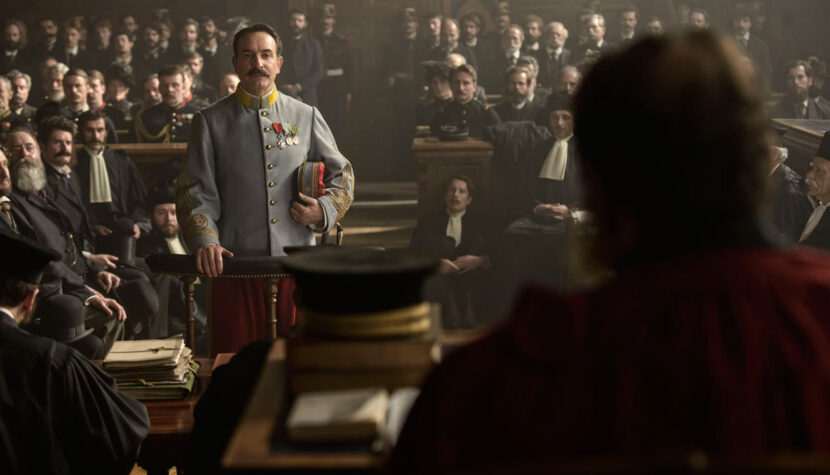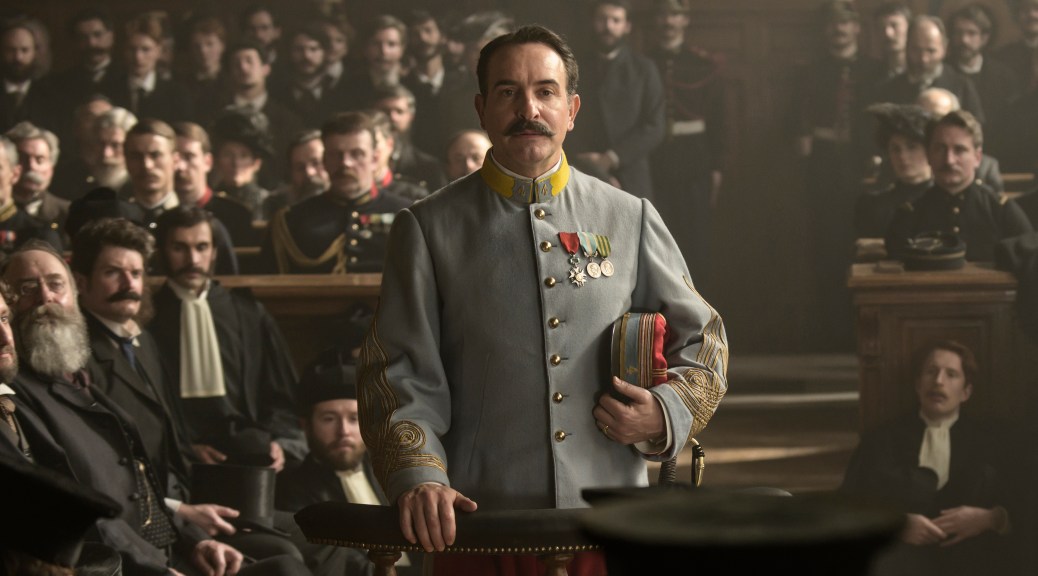AN OFFICER AND A SPY. “It’s a shame to be French”

An Officer and a Spy entered the world’s cinemas amidst a scandal. It all began at the Venice Film Festival, where, following a controversial statement by Lucrecia Martel (the jury president), Polanski’s film was almost withdrawn from the main competition by the producer, who felt rightfully offended and concerned about potential bias from the jury. Later, things didn’t get any better – due to a protest by a group of around 40 women, the pre-premiere screening of Officer and Spy in Paris was canceled. As if that weren’t enough, Roman Polanski faced an unpleasant surprise in Poland. Some students at the Lodz Film School vocally objected to a planned meeting with the director, who had come to Poland to receive an award at the 24th Cinergia European Cinema Forum. Ultimately, due to the student protest, the planned meeting did not take place.
Why am I writing about all of this? Well, because the whole commotion surrounding An Officer and a Spy and its creator strangely coincides with the content of the film itself, which is centered around a scandal. Not just any scandal, but the infamous Dreyfus Affair – a case that was on everyone’s lips throughout Europe at the end of the 19th century. Polanski makes Colonel Georges Picquart (portrayed brilliantly and subtly by Jean Dujardin), a man who initially, convinced of the officer’s guilt (espionage for foreign powers), assists in his arrest, only to later, after taking over as the head of counterintelligence (referred to as the Statistical Section in France at the time), completely reverse his stance on the entire situation and embark on a daring public rehabilitation process for Captain Alfred Dreyfus (also very convincingly portrayed by Louis Garrel, almost unrecognizable due to his transformation), the focal point of his film.

The first part of the film is devoted to a meticulous investigation in which Colonel Picquart reviews the evidence gathered by his predecessor, hidden in a secret Dreyfus file. It quickly becomes apparent that this legendary file contains only minor clues – glued-together notes from the trash bin of the German embassy. Furthermore, the name of the degraded officer, publicly branded a traitor by the entire nation, is not found on any of the “incriminating” documents. Surprised, Picquart decides to share his discovery with higher-ranking military officials, hoping that one of them will help him rectify the terrible mistake made by the French justice system. However, he faces immediate resistance. “We don’t want another Dreyfus Affair,” he hears from his superior, who dismisses him. “It’s not a second Dreyfus Affair, General; it’s still the same one,” the main character responds, even more determined to fight for justice.
In the second part of the film, Polanski focuses on Dreyfus’s rehabilitation trial. Picquart openly rebels against his superiors and begins a legal crusade reminiscent of David’s biblical battle against Goliath. With the revolt, the previously orderly life of the protagonist undergoes a sudden destabilization. This is emphasized visually – in the second part of An Officer and a Spy , Pawel Edelman’s camera becomes much more mobile. During the investigation, the camera is mostly static, but in the later phase of the film, it frequently follows the main character (it’s evident that Polanski, like Kubrick, enjoys using impressive tracking shots), who, due to the accelerated pace of events, is constantly on the move – changing residences and seeking potential allies among acquaintances. He eventually encounters arguably the most crucial ally of all – Emile Zola, who publishes a controversial open letter to the President of France in the pages of the Parisian magazine “L’Aurore,” titled “J’Accuse,” literally meaning “I Accuse.” This is where the original French title of Roman Polanski’s film comes from.

The English title, on the other hand, comes directly from Robert Harris’s novel, on which the screenplay is based. Polanski had previously collaborated with Harris on one of his earlier works, The Ghost Writer. When it comes to Polanski’s filmography, An Officer and a Spy seems to have the most in common with The Ghost Writer. Both skillfully lead the intrigue against a political backdrop, consistently build a fatalistic atmosphere inseparably tied to the elite’s conspiracy, and feature a protagonist cornered by forces much more powerful than him (a common trait in many of Polanski’s films, particularly highlighted in the famous apartment trilogy), daring to take on the impossible despite being fully aware of his meager odds. All of this can be found in both The Ghost Writer and Polanski’s latest film; only the era changes.
Colonel Picquart and Captain Dreyfus meet only a few times throughout An Officer and a Spy . As the first of them summarizes in the final scene of the film, “We’ve never had the chance to speak privately.” Despite Alfred Dreyfus’s ultimate rehabilitation and the apparent happy ending, Officer and Spy leaves its viewers in a rather somber mood. What lingers is a profound sense of injustice that befell the officer due to his background, the horrifying scene of anti-Semitic riots in Paris (in a sense, a foreshadowing of the madness that would grip Europe in less than 50 years), and a brief line spoken by one of Picquart’s allies during a secret meeting: “It’s a shame to be French.”

